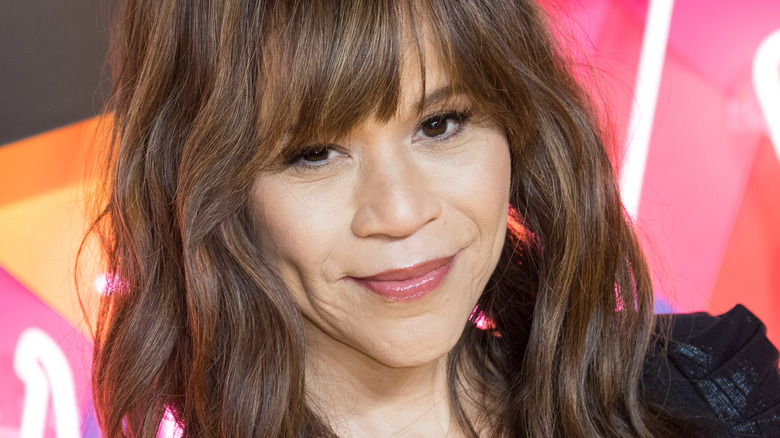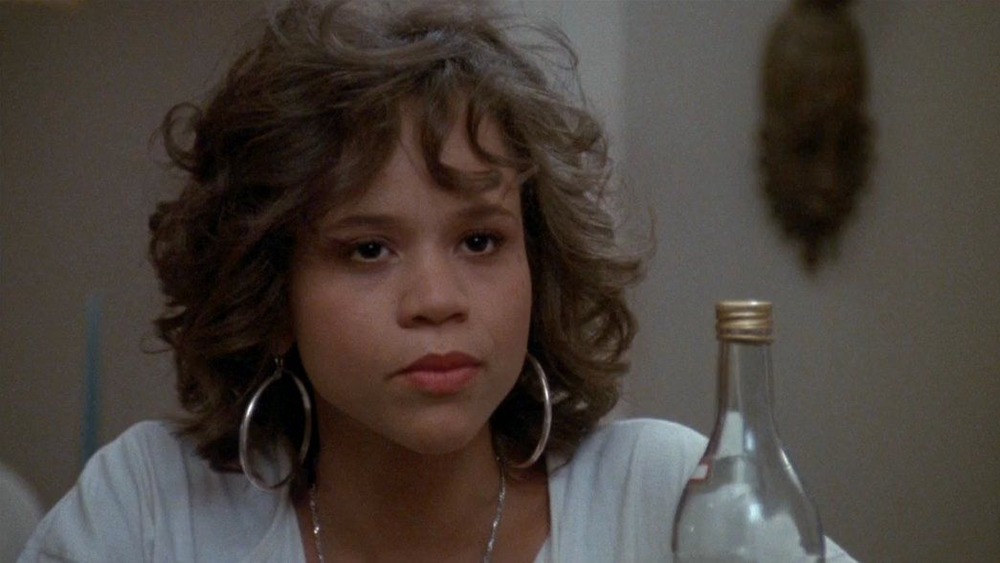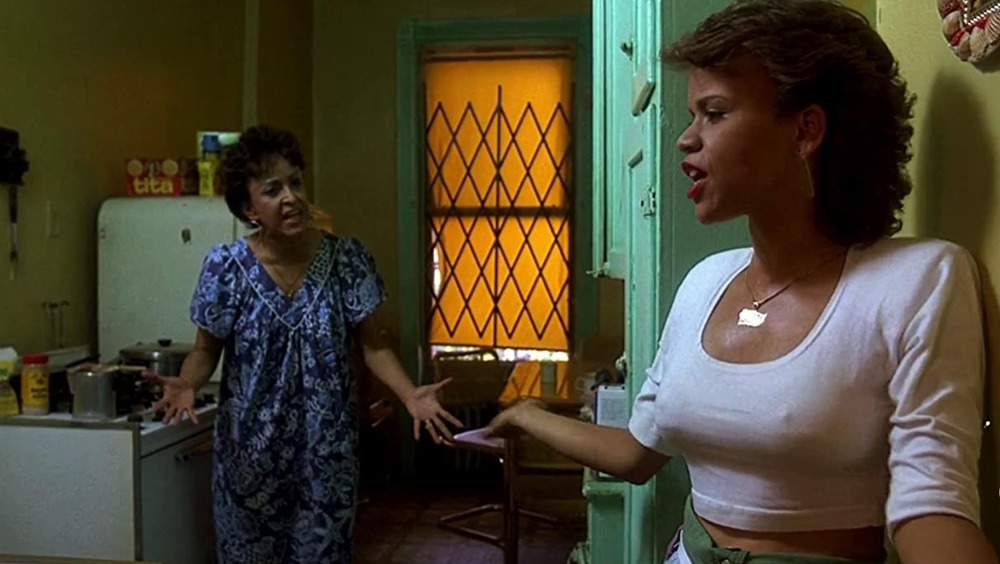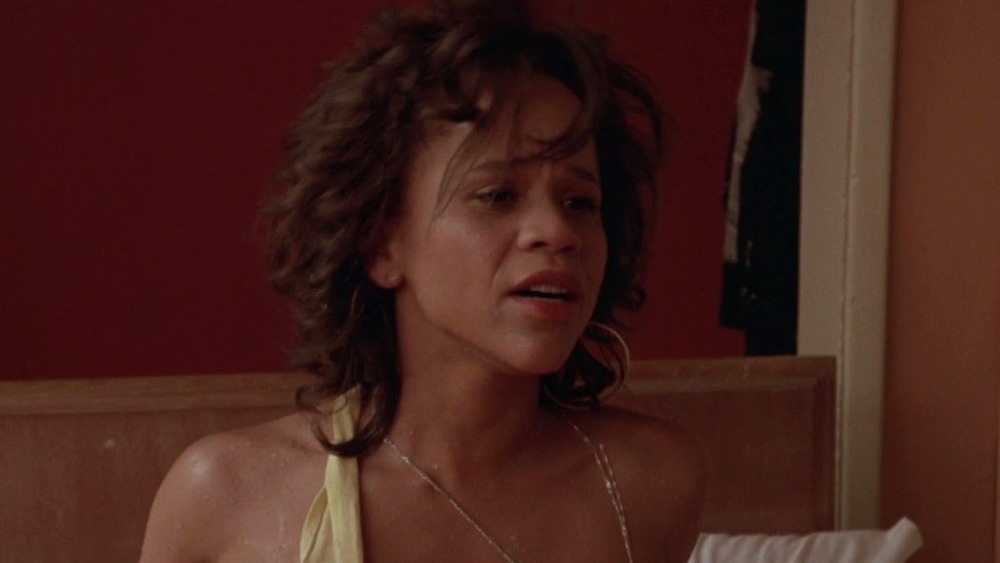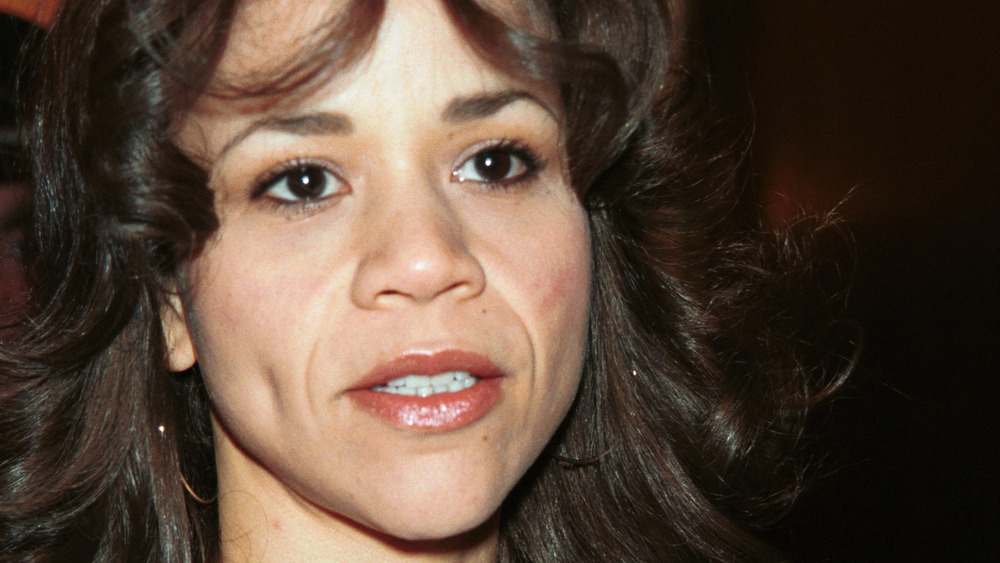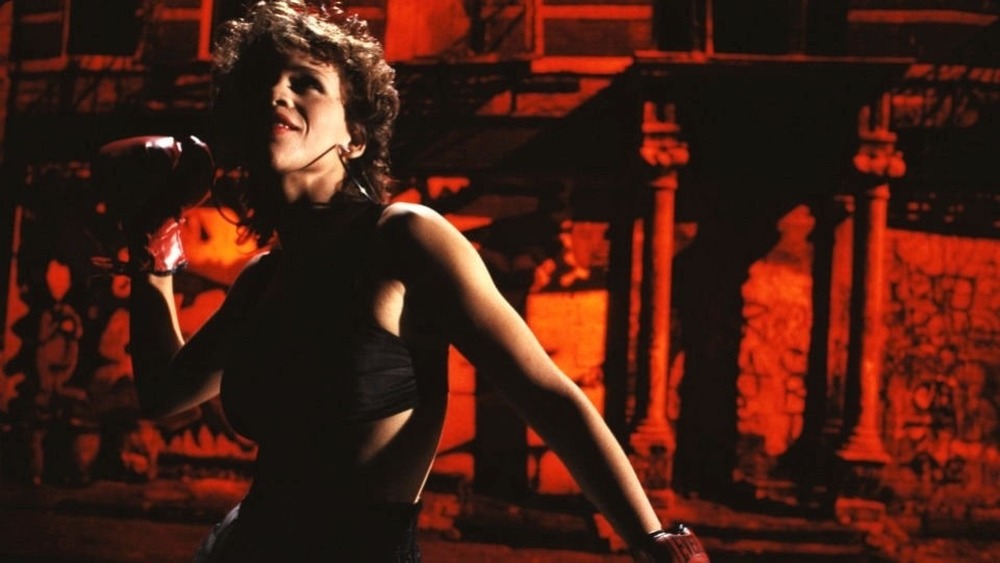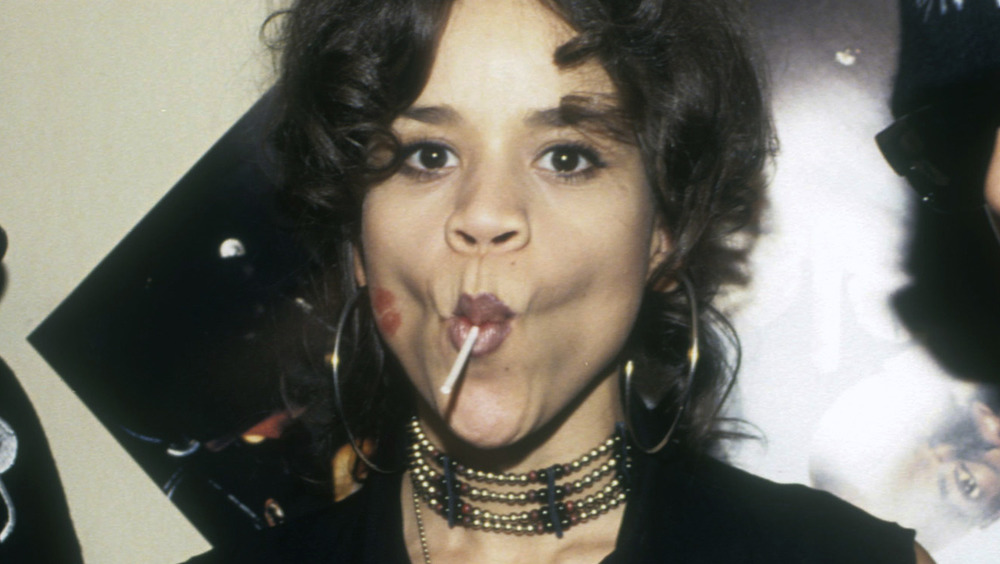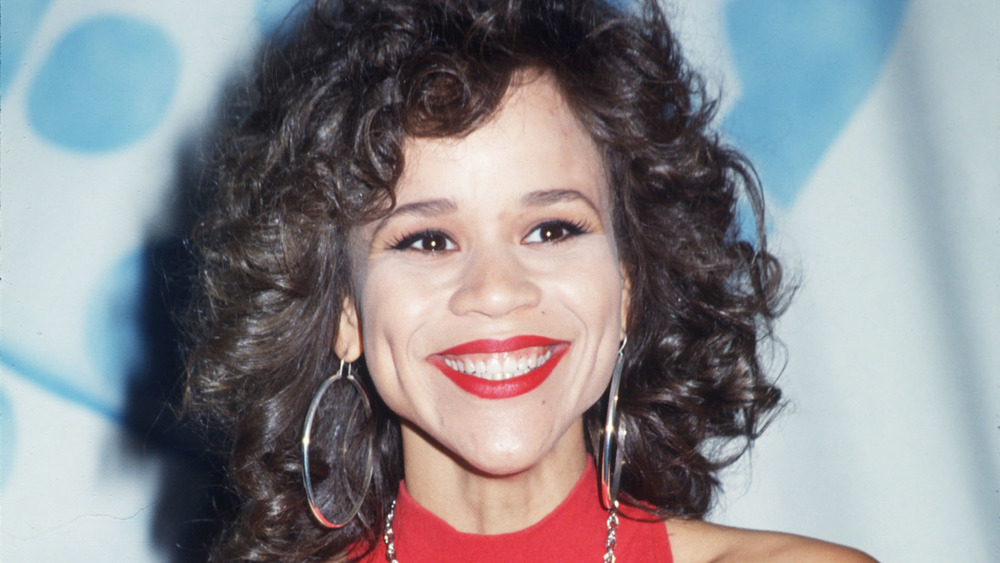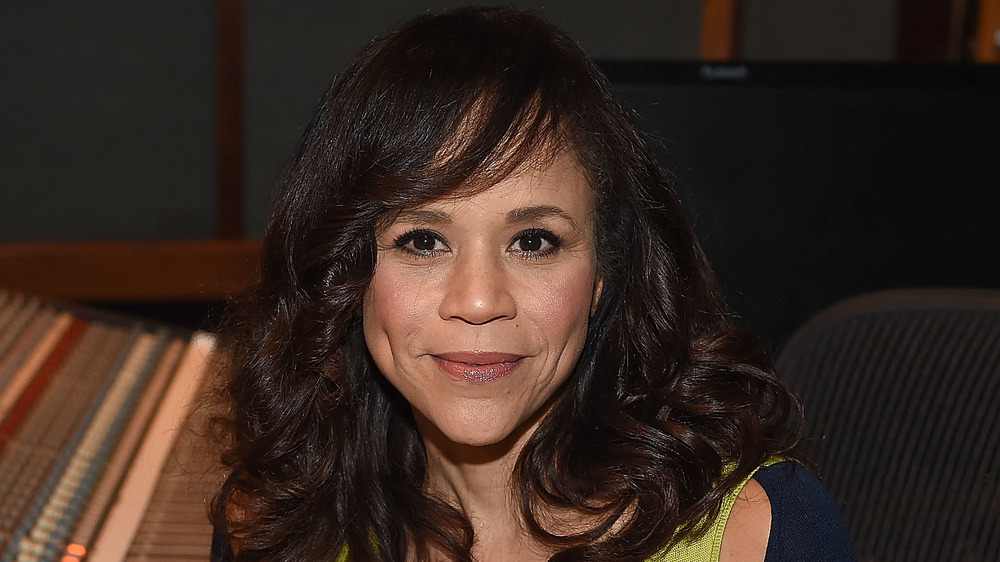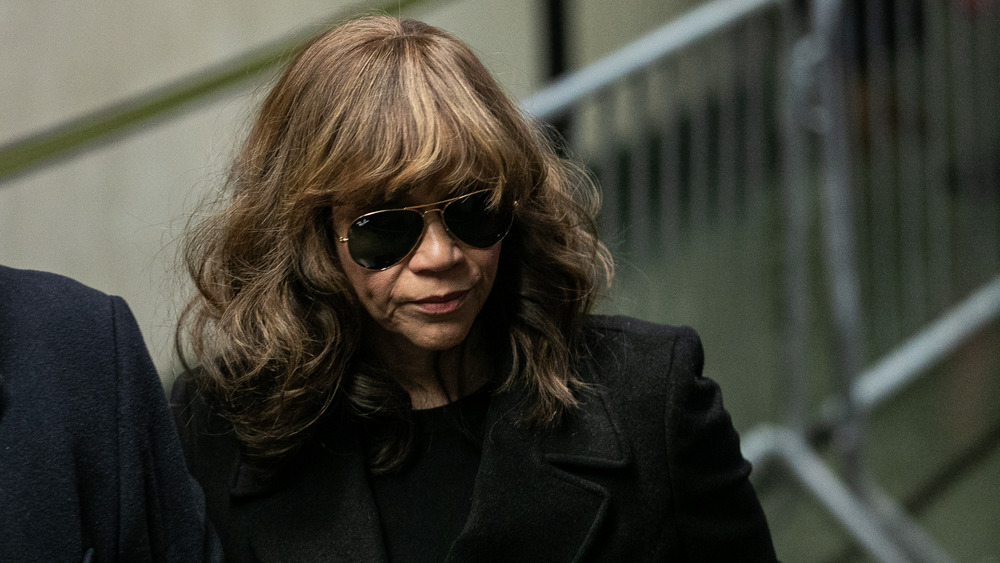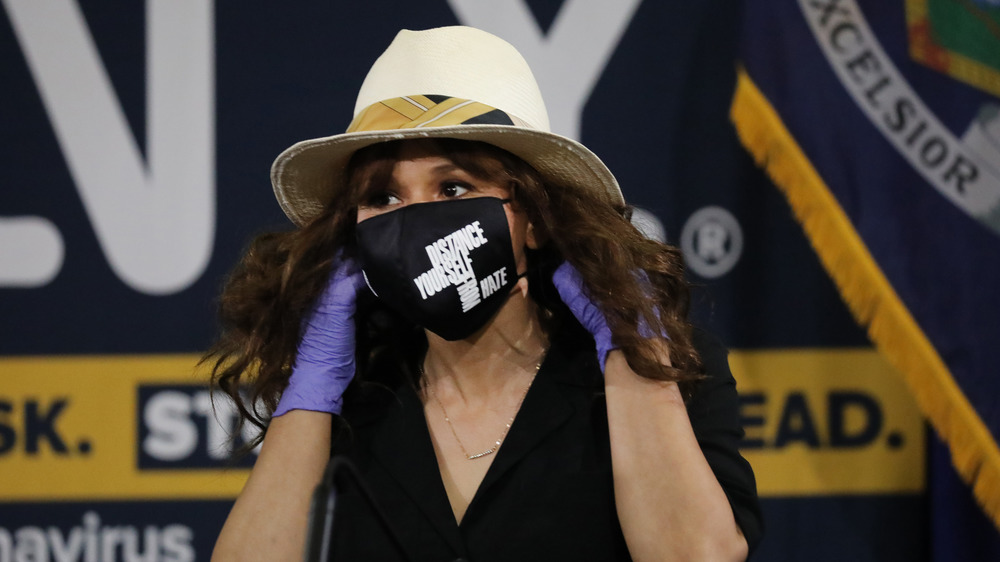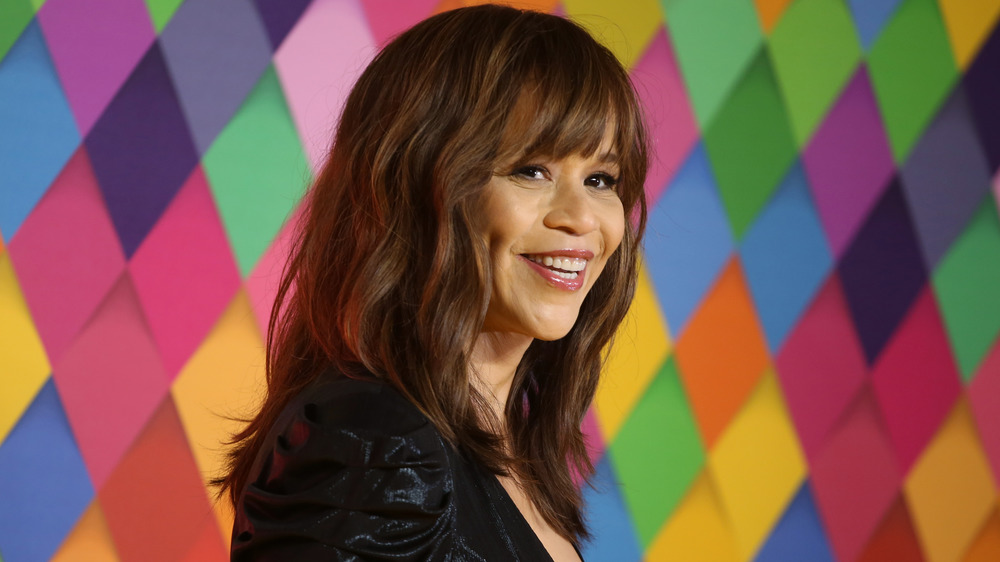The Tragic Real-Life Story Of Rosie Perez
When proud New Yorker Rosie Perez moved to California to help her struggling cousin look after her two kids, she had no intention of becoming famous. The Brooklynite worked a number of part-time jobs while studying biochemistry at college, and in her down time, she liked to go dancing at local night clubs. The 19-year-old was throwing shapes at a joint called Florentine Gardens one fateful evening when she was spotted by a talent scout from the long-running music and dance show, Soul Train. "Being a teenager, being asked to go on Soul Train, it was just — it was mind-blowing," Perez told Esquire.
Perez's movie career got started in similar fashion. Legendary filmmaker Spike Lee cast the diminutive dancer as his girlfriend in 1989's Do the Right Thing after a run-in at Funky Reggae, her favorite club. "He was having a private party there," Perez explained to the Chicago Tribune. "I was on top of a speaker, and he told his bodyguard to pull me down ... He tried to hit on me, so I had to dis him." Lee saw star quality in this feisty woman, who would receive widespread praise for her turn as firecracker Tina. She went on to establish herself as a Hollywood actress and, later, a TV personality, which is quite remarkable when you consider the odds she was up against.
From her turbulent and violent childhood to her overseas COVID-19 ordeal, this is the tragic real-life story of Rosie Perez.
Rosie Perez believed her aunt was her mom
Rosie Perez took a deep dive into her troubled upbringing in her 2014 memoir, the brilliantly titled Handbook for an Unpredictable Life: How I Survived Sister Renata and My Crazy Mother, and Still Came Out Smiling (with Great Hair). In the book, the Daily News reports, the actress revealed that her mother briefly left her longtime husband for another man when she fell pregnant with his child. They moved into a Brooklyn apartment together, but things were over before Perez was even born — her dad jumped out of the window when her mom allegedly pulled a gun on him and didn't look back. Perez's mom returned to her husband just before she was born, but there wasn't a place for the child.
Luckily for Perez, her paternal aunt was happy to have her. She moved in with her as an infant, and would spend the first three years of her life believing she was her mother. The arrangement worked for everyone — until Perez's mother showed up out of the blue and "demanded" the child be turned over to her. With no legal right to keep hold of her, Perez's aunt reluctantly let her go, and a matter of days later, her mother did the same thing.
Perez hadn't been back with her mom more than a few nights when she was suddenly abandoned at a Catholic children's home in Westchester County. "From the day I could remember her, I felt rejected by her," Perez told Aljazeera America.
Rosie Perez was terrorized by a 'sadistic' nun
Being ripped away from her loving aunt was traumatic enough for three-year-old Rosie Perez, but her move to St. Joseph's Catholic Home for Children was made all the worse by the abusive nuns. Not all the staff at the home were violent, but a handful of bad eggs reportedly used to make Perez's life hell. "There were certain people that were supposed to be taking care of me that were hurting me," the actress told Aljazeera America. "It was confusing at first: Who's my mother? Who's my aunt? Why am I here? Who are these people with the funny scarves on their heads?"
The worst perpetrator was the woman referenced in the title of Perez's memoir, Sister Renata. "I think she was a little bit more sadistic than the standard strict nun," Perez went on to explain. "She went overboard." Perez went as far as calling Sister Renata "evil incarnate" in her memoir, going into detail about a disturbing incident that allegedly took place when she was just six years old.
After she was caught giggling, Sister Renata ordered her to stand face-up against a metal locker for an hour. According to Perez, the nun pulled up a rocking chair and kept watch. "After a few minutes, which felt more like an hour, my eyes started to close shut," Perez wrote. "... Bam! Sister Renata banged my head into the metal locker." Sadly, this wasn't an isolated incident — the abusive nun used to backhand Perez across the face regularly, the actress claimed.
Rosie Perez's real mom used to beat her without warning
When Rosie Perez was eight, she got the chance to join her half-siblings at a group home upstate. She was finally able to enroll in the regular school system, and she unknowingly began to shape her future ("I knew how to choreograph because I was part of the cheerleading squad in upstate New York," the In Living Color choreographer told Elle). The move was good for her, but her visits home to see her mother were anything but. Perez's half-siblings told her that their mom was schizophrenic. All she really knew was that she would sometimes get punched for no apparent reason. Her mother reportedly hadn't lost her love of firearms, either — on one home visit, she walked her daughter into a convenience store with a concealed gun and forced her to shoplift.
Speaking to Aljazeera America, Perez revealed that even though her mom used to treat her horribly, her rejection still hurt. "That's the crazy dynamics that exist with the abuser and the person being abused — especially a child and their parent," she said. "You want your parent to love you. You want your parent to want you. Then after a while, after they beat you down so much, you want them even more."
It was the state that gave Perez the support she needed to succeed, something she's eternally grateful for. "Certain policies allowed me to better myself, because I wanted better, and I knew I was better," she said.
Rosie Perez was sexually assaulted by her half-brother
The group home upstate was a huge improvement for Rosie Perez, but it was still a dangerous place for a young girl to be. Instead of a sadistic nun, there was a sketchy counselor who was later dismissed after an allegation of rape was made against him. According to Perez, the counselor in question once cornered her half-sister in a room and would have likely raped her had she not been there to intervene. Sadly, nobody was there to help Perez when she was subjected to sexual assault in the one place she should have been able to feel safe — her mother's home. To make matters worse, the perpetrator was a family member.
Perhaps the most horrifying reveal from Perez's 2014 tell-all book was that her half-brother sexually assaulted her on two separate occasions during her childhood. The alleged attacks took place when Perez was home visiting her mother, who she said reacted violently after her daughter told her what had happened. "You think he would pick you out when you're the ugliest," Perez's mother told her, as she revealed in her book (via the Daily News). "He can pick any of your sisters who are prettier than you."
Perez was beaten and branded a liar by her mom, and her half-brother was never prosecuted for his crimes, per CNN. For Perez, helping her half-siblings break the cycle of abuse (all of them were victims, she said) was the most important thing.
Rosie Perez learned how to box
It didn't take Rosie Perez long to get sick of the beatings coming at her from all angles. She realized pretty quickly that she needed to know how to properly defend herself against attackers, and she knew right away which discipline was for her. The actress has been into boxing since she saw Wilfred Benitez (who, like her, is of Puerto Rican decent) lose to Sugar Ray Leonard as a teenager. "I wanted to cry because the Boricua lost," Perez told The New York Times. "But I was also happy because Sugar Ray won. I felt so guilty about that, but I just loved the way he fought. That's when I knew I was hooked. I was a boxing fan for good."
Perez got deep while discussing boxing with Aljazeera America, calling it "a metaphor for life" during a revealing interview. "Boxing, the sweet science, is to hit and not get hit," she said. "I had to physically fight back or else, you know, my a** was going to get kicked. And it did, a lot. And I got tired of it, so I learned how to box. I learned how to fight."
Perez would go on to utilize her combat skills throughout her career. She boxed during the iconic opening credits sequence of her debut film, Do the Right Thing, and she was still throwing punches at 55 when she played disillusioned Gotham City cop Renee Montoya in 2020's Birds of Prey.
Someone tried to slash Rosie Perez's face in the schoolyard
When Rosie Perez left her group home at the age of 14, it wasn't her biological mother she moved in with, it was her original mother — her beloved aunt. She was happy to finally be back, even if there wasn't much cash to go around. "I didn't include this in the book but once, when work was slow and money was tight, my aunt cut up some Slim Jim's — she worked at the factory in Brooklyn — and put it in the rice as meat for dinner," Perez told CNN. "We looked at each other and I could tell she was embarrassed but just then she said, 'Hehehe,' and we started laughing so hard."
Perez's aunt enrolled her at Grover Cleveland High School in Queens, where trouble found her once again. "I grew up hard knocks," she explained to The New York Times. "I learned to fight my way through life. You get knocked down, you get back up again. I think that's why boxing resonated with me so much even as a little girl." The new girl was involved in regular schoolyard altercations, but none of it fazed her until another student decided to pull a razor on her one day, threatening to cut out her dimples.
Boxer or not, that was the final straw for Perez, who decided it was time to put New York City in her rear view mirror and start over fresh out in California.
The industry tried to white-wash Rosie Perez
The very first time that Rosie Perez traveled abroad, she experienced racial profiling. Authorities at London's Heathrow Airport subjected her to a full-body search because they assumed she was a "drug mule," the actress told Uproxx. Sadly, things weren't much better back home in the United States. Perez found that, as a woman of color, respectable roles were exceedingly hard to come by.
"When I first started in this industry, they didn't want [diversity]," she told People. "They wanted me to be completely white-washed, [but] I've never shied away from portraying my Puerto Rican-ness." In her memoir, Perez revealed that she almost didn't get to play what's arguably her most iconic role in the film, White Men Can't Jump, because producers were nervous about her ethnicity. "The studio, as I was told, had a problem that I was Puerto Rican," she wrote, adding that "they were worried about the interracial aspect" of her relationship with Woody Harrelson's character. Harrelson wasn't having any of it — he clicked with Perez during her audition, and the Cheers star stood his ground against the big wigs.
The rest is history, but that kind of discrimination is still rampant in Hollywood, according to Perez. "I think it's really, really important for Latin actors and actresses to go out for roles that are not specifically designed for a Latino character," she told People. "Let them know that we're not just one thing ... we're human beings first and Latinos second."
Rosie Perez has been diagnosed with PTSD
Now that you're aware of the many hardships she endured in childhood, it probably won't surprise you to learn that Rosie Perez has been diagnosed with post-traumatic stress disorder. The actress spent years believing she was over everything that happened to her, but when she finally plucked up the courage to talk to someone, she realized that she'd had a ball and chain around her neck since childhood.
"Initially it wasn't a relief," Perez told Time magazine (via HuffPost). "It was kind of like, 'Oh my goodness, I'm human.' I didn't have that much control over my emotional response, the way I thought I did. And then there was this big sigh and it was like a weight was lifted off of me."
Perez didn't decide to talk to a professional about her traumatic past until she was well into adulthood. One of the reasons she avoided getting help for such a long time is because there's a stigma associated with mental health issues where she grew up. "I've heard racist remarks that refer to getting psychotherapy help as 'being white,'" Perez told CNN. "Therapy is not a 'white thing,' it's a clinical thing." The stigma exists in Hollywood, too. During an interview with Shondaland, Perez revealed that the one time she confided in a producer about her state of mind, everyone on set found out. "I was chastised for reacting, which made me look even more insane in their eyes," she said.
Rosie Perez held onto a dark secret about Harvey Weinstein for years
Rosie Perez was one of the many actresses that spoke out against predatory movie producer Harvey Weinstein, who was sentenced to 23 years in prison after being found guilty of two charges related to sexual assault in March 2020.
In January of that year, Perez testified that actress Annabella Sciorra told her that Weinstein had raped her. Perez said that The Hand That Rocks the Cradle star made the confession back in the mid-90s, but she was sworn to secrecy by her terrified friend. When defense lawyers asked her why she didn't overrule her friend and take it upon herself to out Weinstein as a rapist, Perez said that she was being "respectful" of Sciorra's wishes (via AP News).
Sciorra (who told jurors that Weinstein forced himself on her sometime in 1993 or 1994 after barging his way into her New York apartment) initially refused to identify her attacker, only revealing that she had been raped by someone. A few months later, Perez heard a rumor that Weinstein had been harassing Sciorra in London and the penny dropped. She called her friend, and her fears were confirmed. "I said, 'He's the one that raped you,'" Perez recalled on the stand, adding that both women broke down in tears at this point. Perez said that she then begged Sciorra to go to the police, but she replied: "I can't — he'd destroy me."
Rosie Perez feared for her life after catching COVID-19 in Bangkok
Rosie Perez has never enjoyed flying, but she decided to take a part in the HBO series, The Flight Attendant, because star Kaley Cuoco really wanted her on board. Production on the show was temporarily shut down due to COVID-19, a virus that Perez was well aware of long before it started claiming scores of lives in Europe and America.
In an interview with Uproxx, the actress revealed that she contracted coronavirus while traveling to Thailand to film The Flight Attendant in late 2019. "At that time, they were saying it's a new respiratory tract infection," she said. "We don't really know what it is and what it does, but it attacks the respiratory system first and then travels to other parts of your body."
What happened next left the American terrified. "I remember my manager was with me, and I said, 'Tarik, don't let me die in Bangkok.' And he goes, 'Oh my God, you're scaring me.' And the head of the ICU says, 'You should be scared, sir. This is serious. We're going to have to put her in a separate room.'" The actress was isolated in a foreign country, and to make matters worse, the virus was pummeling her. "Hit me like a ton of bricks, [I] knew something was wrong" she told Trevor Noah on The Daily Show. "I was feverish, I had a horrible cough. It felt like someone was stepping on my chest. And I was very lethargic and I was very scared."
Rosie Perez is now a mental health advocate for people of color
She became an Academy Award-nominated actress against all the odds, and now Rosie Perez wants to help others open up about their mental health struggles, people of color in particular. The actress has seen too many people shun the help that they need out of a misplaced sense of pride, and she's out to put an end to it.
"As people of color, sometimes we don't get the mental help we need," the dancer-turned-movie star told the New York Amsterdam News. "We might go to a church or something, but that's not enough. I was hit in the head repeatedly — physically, mentally and emotionally. But I understood my spirit and I honored my spirit. I understood that I was special. I wanted to be the best me I could be, so I went and got help."
Perez believes that if speaking to somebody worked for her, then it can work for anyone, but finding the right person to talk to is absolutely key. The New Yorker tried a few different professionals before she settled on one who understood her wants and needs. "A friend introduced me to a psychoanalyst and we clicked," Perez told Shondaland. "She didn't let me get away with things ... She said, 'If you're not going to be truthful, this isn't going to work.'" After years of struggles, Perez was finally able to take control of her demons, and she's apparently happier than ever.

